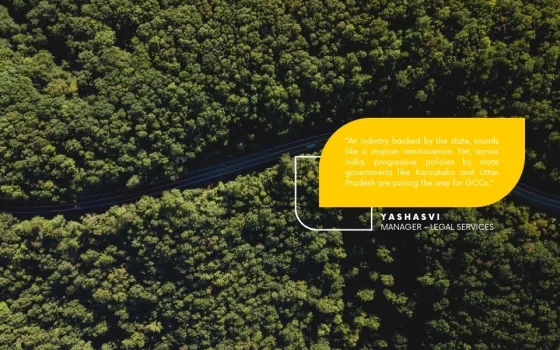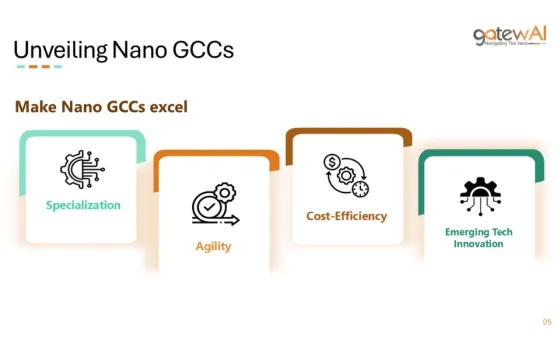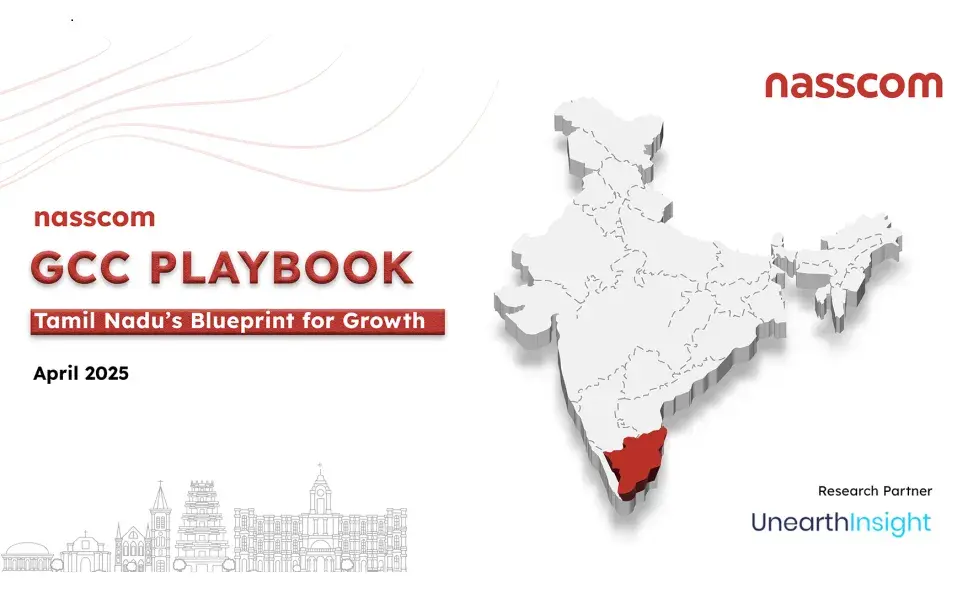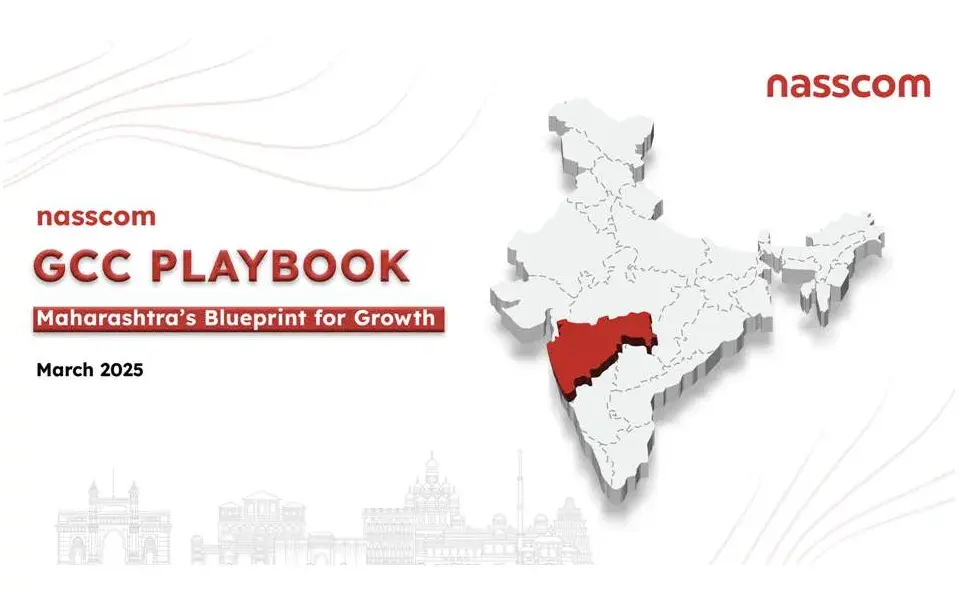Karnataka GCC Policy 2024-2029: A Pioneering Vision for Global Capability Centres
Introduction: Karnataka at the Forefront of GCC Evolution
Karnataka, often celebrated as India's innovation capital, continues to lead the charge in fostering Global Capability Centres (GCCs). With over 500 GCCs already established, accounting for 35% of the nation’s GCC workforce, the state is a critical hub for this transformative business model. The Karnataka GCC Policy 2024-2029 aims to consolidate this leadership position by attracting 500 new GCCs, generating $50 billion in economic output, and creating 3.5 lakh jobs by 2029.
Why GCCs Matter: Driving India's $1 Trillion Digital Economy
Global Capability Centres have evolved from back-office roles to become crucial drivers of innovation and value creation for multinational corporations (MNCs). Karnataka, particularly Bengaluru, is central to this evolution, housing 30% of India’s GCCs. The state's leadership in AI, deep-tech, and digital transformation places it at the core of India’s ambition to achieve a $1 trillion digital economy. The policy is well-aligned with this vision, supporting not only MNCs but also start-ups, academia, and local industries to collaborate seamlessly.
Vision 2030: A Sustainable, Inclusive, and High-Value Ecosystem
Karnataka’s vision for its GCC ecosystem by 2030 is one rooted in sustainability, inclusivity, and innovation. The policy emphasizes:
- Workforce Empowerment: Focus on lifelong learning, upskilling, and reskilling, with dedicated mentorship for women and transgender employees.
- Adaptive Work Models: Embrace hybrid work models to support employee well-being and business resilience.
- Sustainable Business Practices: Lead in green initiatives, promoting ethical governance and digital transformation.
This comprehensive vision not only ensures economic growth but also promotes an ethical, future-ready workforce that aligns with global trends.
Strategic Pillars of the Karnataka GCC Policy
The policy is built around four key pillars: Talent, Local Ecosystem, Infrastructure, and Regulatory Easing.
1. Talent: Nurturing a Future-Ready Workforce
The policy’s talent initiatives are centered on building a robust talent pool equipped to meet the demands of cutting-edge industries. Highlights include:
- Global Leadership Development: Karnataka will foster partnerships with prestigious institutions to cultivate leadership skills, ensuring future leaders are well-versed in interdisciplinary competencies.
- Internships & Skilling: A target of 1 lakh internships will be facilitated, with reimbursement for companies providing these opportunities. Skilling initiatives will focus on both technical and soft skills, with state support for curriculum development and training.
- Research Collaboration: Joint research projects between academia and GCCs will be funded, encouraging industrial applications of academic research.
2. Local Ecosystem: Empowering Innovation through Collaboration
Karnataka's ecosystem, with its network of start-ups, incubators, accelerators, and research institutions, is unparalleled. The policy strengthens this ecosystem by promoting:
- Innovation Labs and Centres of Excellence (CoEs): The government will fund new innovation labs, with a particular focus on AI and deep-tech. Start-ups will be supported to use GCC labs and technology spaces.
- Beyond Bengaluru Initiative: The policy focuses on spreading the GCC ecosystem beyond Bengaluru to cities like Mysuru, Mangaluru, and Hubballi-Dharwad-Belagavi. Special packages, including rental reimbursement and EPF contributions, will be offered to GCCs setting up in these regions.
3. Infrastructure & Incentives: Creating World-Class Facilities
Karnataka’s infrastructure is pivotal in supporting the expansion of the GCC ecosystem. Key initiatives include:
- Global Innovation Districts: Three new technology parks will be established, one in Bengaluru and two Beyond Bengaluru, fostering a collaborative environment for businesses and academic institutions.
- Rental Reimbursements: GCCs setting up in Beyond Bengaluru regions will receive rental reimbursements, encouraging the decentralization of growth.
- Sustainable Infrastructure: Emphasis on green infrastructure, smart city mobility, and enhanced regional connectivity will underpin these innovation districts, enabling seamless operations.
4. Regulatory Easing: Simplifying Processes for GCCs
A business-friendly regulatory environment is essential for attracting and retaining investment. The policy will create a Dedicated GCC Support Unit to streamline operations, fast-track approvals, and provide a single point of contact for all GCC-related queries.
- Fast-Track Approvals: All operational approvals for GCCs will be processed within 45 days, bolstering investor confidence.
- Commercial Real Estate Portal: A digital portal will provide a one-stop platform for GCCs to explore available commercial spaces in Karnataka.
- Support for Employees: Assistance will also be provided to GCC employees, including information on schools, healthcare, and social infrastructure.
Beyond Bengaluru: Decentralizing Growth
While Bengaluru remains the nucleus of Karnataka’s GCC ecosystem, the policy’s focus on the Beyond Bengaluru initiative is a game-changer. Cities like Mysuru, Mangaluru, and Tumakuru are positioned to become significant hubs for GCC expansion, with the government offering substantial incentives for companies that establish operations in these regions. The Beyond Bengaluru Cluster Seed Fund will support early-stage start-ups, fostering innovation and entrepreneurship outside the capital.
AI Skilling and Innovation Fund: Shaping the Future
Artificial Intelligence is a cornerstone of Karnataka’s GCC Policy. The Centre of Excellence for AI will be established in Bengaluru, creating a hub-and-spoke model with academic institutions across the state. The AI Skilling Council will develop and deliver AI-focused curricula, while an Innovation Fund of INR 100 crore will support joint research and innovation challenges.
Conclusion: Karnataka’s GCC Policy - A Blueprint for the Future
The Karnataka GCC Policy 2024-2029 is a forward-thinking, comprehensive framework designed to position the state as the premier destination for global innovation. By fostering talent, infrastructure, and regulatory ease, the policy ensures Karnataka will not only retain its leadership position but also set the standard for global business innovation. With its focus on decentralization through the Beyond Bengaluru initiative and its unwavering support for AI and deep-tech, Karnataka is truly pioneering the future of Global Capability Centres.
As Karnataka embarks on this ambitious journey, the state stands poised to continue as the nerve centre for GCCs, driving both local and global economic transformation.
FAQ: Karnataka GCC Policy 2024-2029
1. What is the Karnataka GCC Policy 2024-2029?
The Karnataka GCC Policy 2024-2029 is a comprehensive policy designed to attract and expand Global Capability Centres (GCCs) in Karnataka. The policy aims to enhance the state’s leadership in innovation, foster talent, support infrastructure development, and create a conducive business environment for GCCs.
2. What are the key objectives of the policy?
The policy has several key objectives:
- Attract the establishment of 500 new GCCs by 2029, bringing the total to 1,000.
- Generate 3.5 lakh new jobs in Karnataka by 2029.
- Create $50 billion in economic output through GCCs by 2029.
- Promote equitable regional development with a focus on Beyond Bengaluru cities.
3. What is a Global Capability Centre (GCC)?
A GCC, or Global Capability Centre, is a dedicated entity that supports multinational corporations (MNCs) by handling various critical business operations. These include IT services, research & development, innovation, customer support, and finance, among others. Initially focused on cost-saving back-office tasks, GCCs today are strategic hubs for innovation and value creation.
4. Why is Karnataka a preferred destination for GCCs?
Karnataka, especially Bengaluru, is home to 30% of India’s GCCs and 35% of the workforce. The state offers a robust talent pool, world-class infrastructure, and a dynamic innovation ecosystem, making it a top choice for MNCs looking to establish GCCs. Additionally, Karnataka’s business-friendly policies and leadership in AI and deep-tech further bolster its position.
5. What are the main incentives offered under this policy?
The Karnataka GCC Policy provides several incentives, especially for GCCs setting up operations Beyond Bengaluru:
- Rental reimbursements for GCCs in Beyond Bengaluru areas.
- EPF contribution reimbursement for new employees.
- Electricity Duty exemptions for five years.
- Grants for R&D infrastructure in Beyond Bengaluru.
- Support for Nano GCCs, which have 5 to 50 employees.
6. What is the 'Beyond Bengaluru' initiative?
The "Beyond Bengaluru" initiative aims to decentralize GCC growth by promoting cities like Mysuru, Mangaluru, Hubballi-Dharwad-Belagavi, Tumakuru, Kalaburagi, and Shivamogga as new hubs for innovation. Special incentives, infrastructure development, and funding support are available for GCCs setting up in these cities, contributing to balanced regional growth across Karnataka.
7. How does the policy support the AI and deep-tech ecosystem?
The policy has a strong focus on Artificial Intelligence (AI) and deep-tech. Key initiatives include:
- Establishing a Centre of Excellence (CoE) for AI in Bengaluru.
- Launching an AI Skilling Council to drive curriculum development and workforce training in AI.
- Allocating a INR 100 crore Innovation Fund to support joint research between academia and GCCs in AI and other deep-tech areas.
8. What is the role of talent development in this policy?
Talent development is central to the policy. The government will support skilling initiatives, internships, and leadership development programs. Companies will be incentivized to skill local talent, with reimbursements for training costs, and 1 lakh internships are targeted during the policy period.
9. How does the policy support collaboration between academia and GCCs?
The policy encourages joint research projects between academic institutions and GCCs. The government will fund up to 50% of research project costs, with a maximum limit of INR 75 lakh per project. A matchmaking platform will also be established to facilitate ongoing collaboration between academia and industry.
10. What infrastructure initiatives are being introduced under the policy?
The policy focuses on enhancing infrastructure in both Bengaluru and Beyond Bengaluru areas:
- Establishment of Global Innovation Districts in Bengaluru and two locations Beyond Bengaluru.
- Development of plug-and-play office spaces and co-working facilities in emerging hubs.
- Improvements in road connectivity, airport access, and telecom infrastructure in Beyond Bengaluru clusters.
11. How does the policy streamline regulatory processes for GCCs?
To ease business operations, the policy introduces:
- A dedicated GCC support unit to handle approvals, regulatory guidance, and real estate needs.
- Fast-track approvals for operational requirements within 45 days.
- A Single Point of Contact (SPOC) assigned to each GCC to manage interactions with the government and simplify processes.
12. How does the policy promote sustainability and ethical practices?
The policy emphasizes sustainable and ethical business practices. It encourages green initiatives, adherence to ESG (Environmental, Social, Governance) norms, and the promotion of digital transformation and responsible AI development, aligning with global trends in ethical governance and sustainability.
13. What is the role of Centres of Excellence (CoEs) under this policy?
Karnataka’s policy supports the establishment of Centres of Excellence (CoEs) in emerging technologies. These CoEs will be linked to academic institutions and industry associations, fostering research, innovation, and collaboration. They will provide essential resources for start-ups and GCCs, promoting Karnataka as a leader in high-tech development.
14. What are Nano GCCs, and how are they supported?
Nano GCCs are smaller entities with 5 to 50 employees. These centres, supported by the Karnataka GCC Policy, will have flexible operations and receive a range of incentives without being subject to minimum employment or investment thresholds. This initiative aims to unlock new growth opportunities for niche players in Beyond Bengaluru areas.
15. How does the policy impact global businesses and investment in Karnataka?
The Karnataka GCC Policy enhances Karnataka’s appeal as a global business hub. With a focus on innovation, talent development, and ease of business, the state aims to attract top-tier global companies, foster international collaborations, and drive significant foreign direct investment (FDI). The policy's global outreach initiatives will further strengthen Karnataka’s position on the international stage.




















